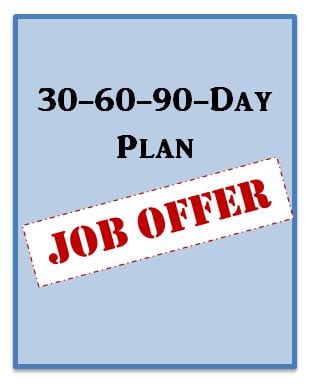 Creating a 30-60-90-day plan is a fantastic way to stand out from your competition in a hiring process. I’ve seen it help people with less experience (or zero experience) beat out others with substantial experience. I’ve seen it boost the value of job offers for those who bring it. I’ve even seen it help job seekers get offers for bigger titles and more senior roles than what they actually interviewed for. It really is kind of an interview miracle worker.
Creating a 30-60-90-day plan is a fantastic way to stand out from your competition in a hiring process. I’ve seen it help people with less experience (or zero experience) beat out others with substantial experience. I’ve seen it boost the value of job offers for those who bring it. I’ve even seen it help job seekers get offers for bigger titles and more senior roles than what they actually interviewed for. It really is kind of an interview miracle worker.
However (there’s always a catch, right?)…some job seekers have said to me, “I don’t know what you’re talking about…I took a plan and didn’t get the job.”
I respond, “Let me see your plan.”
Almost without fail, I see one of two problems:
- They created a plan that was too short and too light on details (like maybe a 1-page 90-day plan).
- They created a plan that was much too long. A 90-day plan that extends out to 10 pages long is more likely to be “Here’s why you should hire me,” instead of what it needs to be: “Here’s what I will do for you.”
Why You Need a 90-Day Plan
It may help you to think of a plan as not being about YOU, but as being about the COMPANY and the Hiring Manager.
You’re creating a 90 day plan so that you can effectively answer and address the 4 most significant concerns of every hiring manager:
- Do you understand the job?
(This would be purpose, tasks, goals, etc.) - Can you do the job?
(Do you know what it will take to accomplish these tasks/goals?) - WILL you do the job?
(Do you have the work ethic and focus to do this job well?) - Do you pose a risk to my own job?
(Hiring you represents a risk to them—so you need to make them feel comfortable and confident with the idea of you being on board.)
Your plan enhances your interview conversation. It helps you address those concerns in a way that ‘normal’ interview questions and answers may not.
It allows that hiring manager to have sort of a ‘test drive’ of you on the job. You’re showing them what you will do, asking questions, getting feedback…which means you’re having an in-depth, professional-level conversation others aren’t having.
That entire experience puts the hiring manager psychologically on your ‘team.’ They become more comfortable with you, excited about the possibilities you represent, and more likely to hire you.
How to Create a Good 30-60-90 Day Plan
A good plan should be written out on paper, either in outline or bullet point form. It should be about 3 pages: one page for each 30-day section, plus a cover sheet. (Some plans could be set up as PowerPoints or other visual presentations.)
The first 30 days primarily focus on:
- getting training
- meeting everyone
- learning the organization’s systems, software or procedures
- possibly making initial evaluations of what needs to be done
In the second 30 days (the 60-day section), you might be:
- getting to know people farther out in the company
- digging deeper into details and/or evaluations
- identifying problems
- building relationships
- reviewing efficiency of processes, procedures, or programs
- getting feedback
- setting goals
During the last 30 days (the 60-day section), you may be:
- beginning your own initiatives or projects
- going after new business on your own
- implementing strategies based on your previous evaluations
- setting long-term goals
These are examples…every job has tasks that need to be done and goals that need to be met in order to be successful, but your plan should be tailored for THAT job in THAT company.
(See 30 60 90 day plan examples for sales, technical, managerial and teachers, as well as how 30/60/90 Day Plans have gotten job offers for nurses, pharmacists, accountants, executives, and so many more.)
If you know this job will move faster and you’ll be expected to be in the thick of things by the end of the first week, then work that into your plan.
For certain jobs, you may want to consider creating a longer-term plan: 6 months or even 1 year.
Be as specific as possible with your plan: Research to find out the names of the training, software, or even customers/competitors. This is very impressive to hiring managers.
Know that it takes some effort and time to create a good 30-60-90 plan. The research you do will not only enhance your plan—it will add power to your interview answers and dramatically improve your entire conversation with the hiring manager because you are more informed and knowledgeable. In the end, it will even help you make a more informed decision about whether or not to take the job.
30-60-90-Day Plan Templates
If you know that you need more help and direction in creating a plan, check out Career Confidential’s proven, tested, 100% guaranteed plans:
